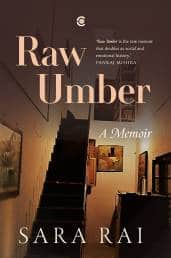



Sara Rai writes stories in Hindi and is a well-known editor and translator. She co-translated PEN/Nabokov Award for Achievement in International Literature 2023 recipient Vinod Kumar Shukla’s Blue is Like Blue: Stories, which won her multiple awards. Raw Umber: A Memoir (Context, an imprint of Westland, 2023, 240 pages, Rs 699) is Rai’s first original work in English.

While memoirs often tend to be solipsistic because of the unfiltered directness and personal-ness of the form, they do speak a universal language. Though people may or may not relate to the author’s particular circumstances, they experience emotions their story elicits. Additionally, any memoir, until and unless hinged on a specific aspect, must reveal the society as a whole. In that regard, Rai’s book meets all expectations.
She not only meticulously captures the socio-political aspects of India of her growing up years (the 1960s), but she also deftly dissects the personal and the political from a treasure trove of memories that she can’t help but remember so vividly. While the latter can only be experienced when one reads this book, sample this text that supports the former claim: “The toilet was the best room with a view into the garden and a door opening outside through which the sweeper entered to clean the bathroom.” In addition to the nostalgia, the sentence conveniently covers the class- and caste-based discriminatory practices followed by the Brahmanical society.
Rai’s astute observation may be an inherited trait. The towering literary personality, Premchand was her grandfather. Shivarani Devi, also a writer of fiction and a forgotten revolutionary in more ways than one, was her grandmother. Both participated in the freedom movements and helped establish a personal connection with the public by assiduously depicting their realities through their fiction. However, for me, Raw Umber is a celebration of the women of her household. Because the myth of Premchand is so overwhelming, it’s easier to miss Shivarani’s contributions. Or as Rai notes, “Whatever we know about her is filtered through the prism of his life.” By re-plugging her writing and sharing one incident when she delivered “a rousing speech denouncing British rule at a public meeting of twelve thousand at the Mahila Ashram”, Rai rebuilds her grandmother’s public image.
Given the time and space that it so ambitiously tries to encapsulate in so few chapters, Rai rightly notes in the preface to this book that this memoir had “long been in the making”. The intimacy the book exudes is a testament to this expression. But most importantly, it’s an ode to language, memory, and one’s relationship with people and material possessions.
Rai begins the book with the usual where-it-all-happened by describing her ancestral house. A family home is no less than a human body. It exhibits all the characteristics of a thriving, lively person when it is fully peopled and utilised, and, on the other hand, mimics the dead when devoid of any activity. But writing the past from memory is reimagining it (in a way). And Rai duly acknowledges the same but also asserts that all of it is “true to [her] own remembering of things.”
Rai writes beautifully about her multicultural roots, sharing anecdotes and practices that may escape the increasingly polarising India of today. Sample this text from House of Fiction: “Among the things you heard about Muharram, one was that a Brahmani anjuman composed of Hindu women used to come to the imambara. There is no sign of them now and there are none left who remember them. The present times encourage dyeing in a single colour the myriad threads that were woven into the tapestry of religious belief.”
For a few, several essays in this book may appear very striking meditations on reading and writing, too. While Rai continues to write fiction in Hindi, why she wrote this personal record of a “whole world lost to us”, as Pankaj Mishra notes, in a language other than her mother tongue bears asking. Perhaps, English lent her the writerly or, as she puts it, the “linguistic distance” she sought. Or, maybe, the real struggle was not to choose a language but to chisel out several aspects of oneself to render this impactful work because ultimately by recollecting and reworking those memories she was in a way dealing with shadows. Which is why the book is appropriately titled Raw Umber, “a natural brown or reddish-brown earth pigment that [Rai’s father] often used” for painting and which also means “shadow” (derived from the Latin umbra). For there could be no other title that could have encapsulated not only the “greater impermanence” and fragility of the memories but also the “sound” and echo of those memories, which play in your head after a long time you’re finished reading this book.
Discover the latest Business News, Sensex, and Nifty updates. Obtain Personal Finance insights, tax queries, and expert opinions on Moneycontrol or download the Moneycontrol App to stay updated!
Find the best of Al News in one place, specially curated for you every weekend.
Stay on top of the latest tech trends and biggest startup news.